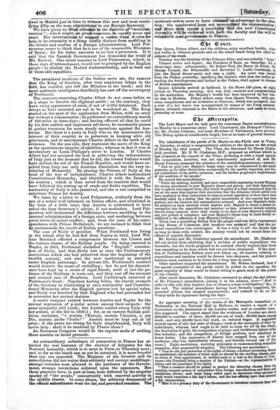The prominent incidents of the Italian news are, the rumour
that the King of Sardinia, after very suspicious delays in the field, has receded, and left the Milanese in the lurch ; and the more authentic intelligence that Sicily has cast off the sovereignty of Ferdinand.
The rumours respecting Charles Albert do not come before us in a shape to deserve the slightest credit ; on the contrary, they
have every appearance of error, if not of wilful falsehood. Such delays as have occurred are not to be wondered at. The King started on the spur of the application from Milan, with an army but without a commissariat ; he performed an extraordinary march
of 156 miles in three days ; and having effected all that he could by his first sudden and impetuous advances, he necessarily pauses to gather resources for more steady operations against the Aus-
trians. But there is a party in Italy who so far misconceive the interest of their country as to persevere in keeping alive old grievances, and to misrepresent Charles Albert in the teeth of all
evidence. On the one side, they represent the move of the King as the spontaneous impulse of ambition ; whereas in fact it was as
involuntary as Louis Philippe's move to London. If Charles
Albert had not accepted the lead in achieving the independence of Italy just at the moment that he did, the roused Italians would
have invited the aid of the French Republic, and would have ex- pelled from Italy not only Austrian Absolutism but the very in- stitution of Monarchy. By placing the Princes of Italy at the head of the war of independence, Charles Albert nationalized Constitutional Monarchy, and identified it with the future of his country ; which is thus saved from the reaction that would have followed the setting up of crude and feeble republics. The nationality of Italy is also preserved, and she is not compelled to substitute France for Austria.
We learn by a letter to Lord Palmerston, evidently from the pen of a writer well informed on Italian affairs, and circulated in the form of a little tract, that Austria is understood to have asked the busy Secretary's advice, if not mediation. Lord Pal- merston will understand the difference between meddling in the
internal administration of a foreign state, and mediating between great states in actual conflict ; and, from the tone of his corre- spondence with Prince Metternich, we are inclined to think that be understands the merits of Italian questions.
The case of Sicily is peculiar. When Ferdinand was living in the island after he had fled from Naples in 1812, Lord Wil- liam Bentinck effected a compromise between the Crown and the various classes of the Sicilian people. On being restored to Naples, in 1815, Ferdinand abolished the "English" constitu- tion of Sicily, and thus Sicily lost at once the Parliamentary institutions which she had preserved from the beginning of the twelfth century, and also the new institution as amended under English patronage. In private life, Ferdinand's conduct would deserve the name of swindling ; but he and his descend- ants have kept up a series of regal frauds, until at last the pa- tience of the Sicilians is worn out, and they cast off the recreant
and scouted race of Bourbons. Lord Castlereagh connived at Ferdinand's fraud : Napoleon having fallen, the sturdy example of the Sicilians in vindicating at once nationality and Constitu- tional Monarchy after the English pattern lost its special value, and Sicily was deserted by that England who had persuaded her to surrender her ancient statutes.
A secret compact existed between Austria and Naples for the mutual repression of popular action among their subjects : the same sympathy still exists ; but Austria cannot sweep Italy with her armies, as she did in 1820-1 ; for, as an earnest Sicilian poli- tician exclaims, "è mutata l'Europa, mutata l'Austria, e, per Dio, mutate anche 'Italia!" Austria must be kept out at all price : if she prove too strong for Italy singlehanded, Italy will invite help : shall it be rendered by France alone ? An European Congress would be the regular mode of settling these matters on broad grounds.


























 Previous page
Previous page